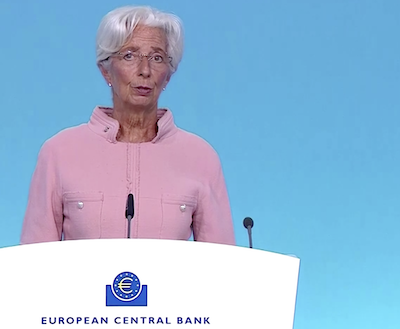The European Central Bank (ECB) has announced it will slow the pace of its emergency pandemic bond-buying program in the final quarter of 2021 — but ECB President Christine Lagarde insisted the ECB is not tapering.
Lagarde told told reporters: “The lady isn’t tapering,” as she used a turn of phrase reminiscent of former UK Prime Minister Margaret Thatcher’s famous line of “the lady’s not for turning.”
Lagarde said: “What we have done today … unanimously, is to calibrate the pace of our purchases in order to deliver on our goal of favourable financing conditions.
“We have not discussed what comes next.”
Lagarde has delayed the decision on how to wind down the €1.85 trillion Pandemic Emergency Purchase Programme (PEPP) until December 16.
Lagarde was speaking after the ECB Governing Council decided it will conduct purchases at a “moderately lower pace” than the roughly €80 billion of monthly acquisitions deployed in the past two quarters.
Reuters reported that “three sources with knowledge of the discussion” said that policymakers set a monthly target of between €60 billion and €70 billion.
The ECB also upgraded its growth forecast for this year to 5% from a previous 4.6% target and raised inflation expectations.
Inflation is now seen at 2.2% this year, falling to 1.7% next year and 1.5% in 2023 — below the ECB’s 2% target.
As things stand, the ECB’s key interest rate remains unchanged at minus 0.5%, PEPP remains on track to end next March and purchases under the older Asset Purchase Programme (APP) remain at €20 billion a month.
The ECB said in its statement: “The Governing Council will continue to conduct net asset purchases under the PEPP with a total envelope of €1,850 billion until at least the end of March 2022 and, in any case, until it judges that the coronavirus crisis phase is over.
“Based on a joint assessment of financing conditions and the inflation outlook, the Governing Council judges that favourable financing conditions can be maintained with a moderately lower pace of net asset purchases under the PEPP than in the previous two quarters.
“The Governing Council will purchase flexibly according to market conditions and with a view to preventing a tightening of financing conditions that is inconsistent with countering the downward impact of the pandemic on the projected path of inflation.
“In addition, the flexibility of purchases over time, across asset classes and among jurisdictions will continue to support the smooth transmission of monetary policy.
“If favourable financing conditions can be maintained with asset purchase flows that do not exhaust the envelope over the net purchase horizon of the PEPP, the envelope need not be used in full.
“Equally, the envelope can be recalibrated if required to maintain favourable financing conditions to help counter the negative pandemic shock to the path of inflation.
“The Governing Council will continue to reinvest the principal payments from maturing securities purchased under the PEPP until at least the end of 2023.
“In any case, the future roll-off of the PEPP portfolio will be managed to avoid interference with the appropriate monetary policy stance.”
Paul Diggle, deputy chief economist, Aberdeen Standard Investments, said: “The ECB today lowered the run rate of asset purchases under the PEPP QE programme, judging that the worst of the pandemic emergency is over and the economy needed slightly less monetary policy support.
“But we continue to think that an end to APP asset purchases and any rate rises remain a very distant prospect indeed, and hence the ECB is best thought of one of the dovish standouts amid a move towards monetary policy support being removed elsewhere.”
